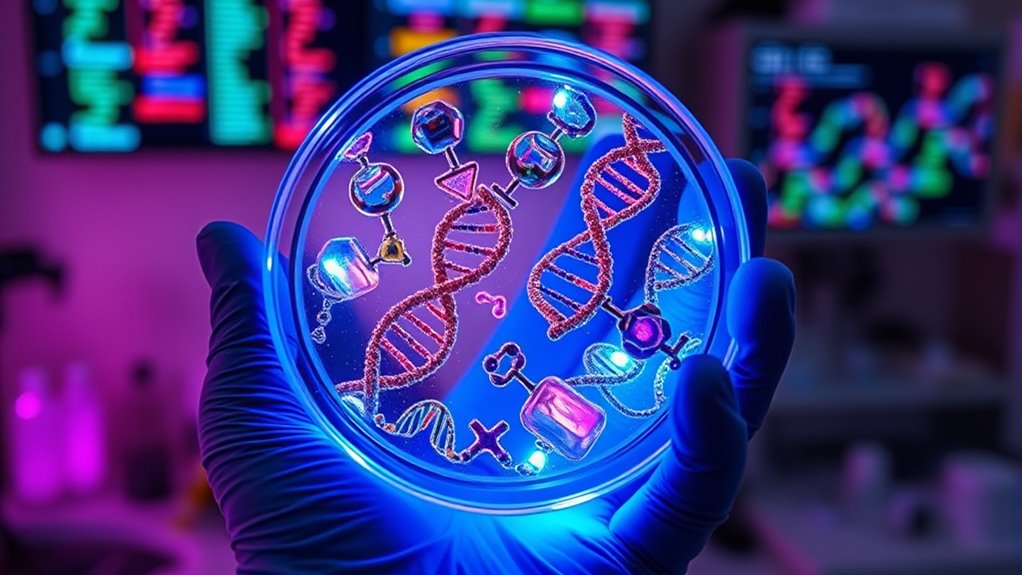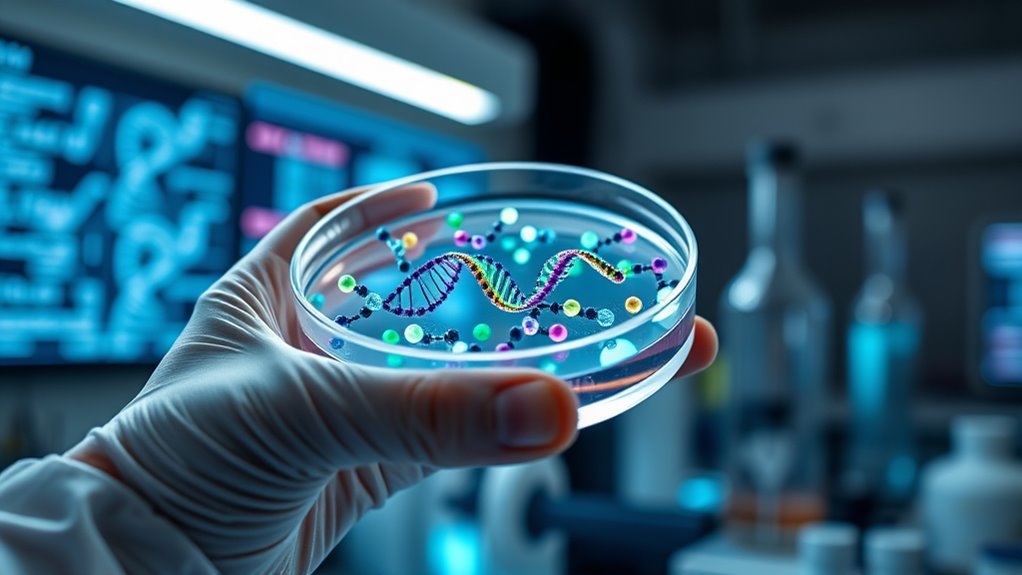Chemistry is key to personalized medicine because it helps create treatments tailored to your genetic and molecular makeup. It involves developing precise diagnostics using techniques like mass spectrometry and chromatography, which identify biomarkers and disease markers. This info guides customized therapies that improve effectiveness and reduce side effects. By integrating chemical design principles with advanced analytical tools, you can see how treatments become more targeted. Continue exploring, and you’ll discover how interdisciplinary efforts are shaping future healthcare.
Key Takeaways
- Chemistry enables the design of targeted drugs with improved specificity and efficacy based on molecular interactions.
- Analytical techniques like mass spectrometry and chromatography detect biomarkers that guide personalized treatment decisions.
- Chemical principles help optimize drug formulation and delivery for individual patient needs.
- Molecular diagnostics use chemical assays to identify genetic mutations and biomarkers, informing tailored therapies.
- Chemical insights support development of gene editing and targeted therapies tailored to a patient’s unique genetic profile.
The Fundamentals of Personalized Medicine

Personalized medicine is a healthcare approach that tailors treatments to each individual’s unique genetic, molecular, and environmental characteristics. You focus on understanding how genetic variations, protein interactions, and metabolic pathways influence your health and disease risks.
This approach uses advanced diagnostics to identify specific molecular markers, enabling targeted therapies that work more effectively and with fewer side effects. It’s grounded in principles like precision diagnostics and the integration of disciplines such as genomics, proteomics, and metabolomics. Genomic information plays a major role in guiding treatment decisions, helping clinicians select the most suitable therapies for each patient.
Your care becomes more proactive, emphasizing early detection and customized management strategies. Incorporating regional healthcare resources can further enhance personalized treatment plans by providing access to specialized expertise and local support systems. By considering your lifestyle and environment, personalized medicine aims to optimize treatment outcomes and improve overall health.
This innovative approach marks a shift towards more precise, patient-centered healthcare.
Role of Analytical Chemistry in Custom Therapies

Analytical chemistry plays a vital role in shaping custom therapies by providing the tools needed to detect and measure molecular markers associated with specific health conditions. Using techniques like mass spectrometry and chromatography, you can identify biomarkers that reveal disease states and predict responses to treatment. These tools enable early, precise diagnostics and disease monitoring at a molecular level, allowing for tailored interventions. Combining data from various sources and applying machine learning enhances diagnostic accuracy and helps interpret complex biomarker patterns. Continuous technological advances improve the sensitivity, portability, and efficiency of diagnostic tools. Collaborating with clinicians, you help design personalized treatment strategies by integrating analytical data with clinical insights—ensuring therapies are specific, effective, and aligned with each patient’s unique biological profile. Advancements in analytical technology continue to expand the capabilities and accessibility of personalized diagnostics, making tailored treatments more feasible for diverse patient populations. Additionally, ongoing research into molecular biomarkers and their associations with specific conditions enhances the precision of personalized medicine approaches.
Leveraging Pharmacogenomics for Optimal Drug Selection

Leveraging pharmacogenomics for ideal drug selection involves analyzing a patient’s DNA to identify genetic variants that influence how medications are metabolized and how effectively they work. These genomic differences affect drug efficacy, cause adverse reactions, and determine the best dosing strategies. Investigating how individual genetic makeup influences drug response helps tailor treatments to each patient’s unique genetic profile. Most people carry variations that can alter drug responses, making genetic testing essential for personalized treatment plans. Using samples from saliva, blood, or cheek swabs, healthcare providers gather genetic data to guide prescribing decisions. This approach helps maximize therapeutic benefits and reduce risks, especially for drugs with narrow therapeutic windows. Pharmacogenomics provides critical insights into gene-drug interactions that support more precise medication management. Clinical guidelines, like those from CPIC, support gene-based dosing.
Decoding Diseases at the Molecular Level

Decoding diseases at the molecular level has become possible thanks to advanced molecular diagnostics techniques that reveal the underlying genetic and cellular changes driving illness. Techniques like PCR amplify specific DNA sequences, allowing you to detect tiny amounts of genetic material in infectious diseases, genetic disorders, or cancers. Next-generation sequencing (NGS) offers high-throughput analysis of entire genomes or transcriptomes, helping identify mutations in cancer and rare genetic conditions. Gene expression profiling measures RNA levels, clarifying gene regulation differences in health and disease, especially for cancer diagnosis. Fluorescence in situ hybridization (FISH) visually detects chromosomal abnormalities, such as gene translocations, vital for prognosis. Microarrays analyze thousands of genes simultaneously, uncovering disease biomarkers and mutation patterns, enabling precise molecular understanding. Molecular diagnostics techniques continue to evolve, providing more detailed and comprehensive insights into disease mechanisms.
Designing Targeted Treatments Based on Genetic Insights

Advances in molecular diagnostics have paved the way for designing treatments that target specific genetic alterations. You can now use genetic tests like GeneSight to understand how genes influence medication metabolism, tailoring treatments to individual needs.
Targeted gene panels and sequencing identify genetic mutations linked to diseases such as cancer, enabling precise interventions. For monogenic diseases, gene-targeted therapies correct specific genetic defects, offering effective solutions.
In cancer treatment, genetic insights reveal actionable mutations, guiding the development of targeted therapies like tyrosine kinase inhibitors. Chemistry plays a crucial role in designing drugs that interact specifically with genetic mutations, improving efficacy.
Additionally, chemical methods support targeted gene therapy delivery and gene editing technologies like CRISPR-Cas9, pushing personalized medicine toward more precise and effective treatments. Targeted gene panels are characterized by high sensitivity for detecting various types of genetic alterations, which enhances their utility in clinical and research settings. Incorporating chemical design principles into drug development further refines the specificity and effectiveness of these therapies.
Cost Efficiency and Improved Patient Outcomes

Have you ever wondered how personalized medicine can be both cost-effective and improve patient outcomes? It’s because targeted treatments reduce trial-and-error approaches, cutting down unnecessary expenses and side effects. Precision medicine can save over a billion dollars in drug development and potentially $26 billion annually worldwide. Most studies show these approaches are at least cost-effective compared to traditional care, with 67% of patients experiencing lower costs. By identifying effective therapies faster, treatments become more successful, leading to better disease management and higher patient satisfaction. In resource-limited settings, data-driven models help prioritize patients most likely to benefit, optimizing costs. The complexity and variability of treatments also pose challenges for economic evaluation, but ongoing advancements in data collection and analysis are helping address these issues. Although regional costs vary, the overall potential for improved outcomes and healthcare savings makes personalized medicine a promising and economically feasible advancement.
Overcoming Challenges in Developing Personalized Solutions

Developing personalized solutions faces significant hurdles that must be addressed before they can be widely accessible. Regulatory and ethical challenges complicate approval processes, as therapies like mutation-specific treatments require rigorous proof of superiority. Regulatory frameworks need to adapt to novel therapies, and issues around data privacy, ownership, and equitable access raise ethical concerns. Addressing these complex issues is crucial for advancing personalized medicine. Managing vast amounts of genomic and clinical data demands advanced cybersecurity and bioinformatics, while consent models must evolve to protect patient privacy. High production costs and complex manufacturing processes hinder scalability, especially with small patient populations. Scientific hurdles include identifying reliable biomarkers and addressing tumor heterogeneity. Overcoming these obstacles requires coordinated efforts to refine regulations, improve data management, reduce costs, and accelerate scientific innovation, making personalized medicine a feasible reality for more patients.
Interdisciplinary Approaches Driving Innovation

Interdisciplinary approaches are essential for driving innovation in personalized medicine, as they bring together diverse expertise to tackle complex health challenges. By collaborating with geneticists, clinicians, data scientists, and ethicists, you can develop thorough treatment strategies that address biological, ethical, and social factors.
Interdisciplinary clinics, like cardio-genetics centers, demonstrate how teamwork enhances personalized care by integrating genetic, psychological, and social insights. Combining biomedical data with machine learning allows you to improve diagnostic accuracy and predict treatment responses more precisely.
Genomic and molecular profiling identify individual genetic variations, enabling targeted therapies. Including legal and ethical experts ensures patient privacy and equitable access. Store hours can influence how quickly and easily patients can access these advanced services.
This collaborative effort accelerates research, refines treatments, and ultimately advances the field of personalized medicine.
Future Directions in Tailored Healthcare

The future of tailored healthcare is shaped by a shift toward more flexible, patient-centered models that prioritize convenience and personalization. You’ll see care moving to alternative sites, offering greater flexibility and comfort. Personalized healthcare plans will be based on your genetics, lifestyle, and social factors, making treatments more effective. Technology like AI, genomics, and wearables will play a bigger role, predicting risks and advising on health strategies. Healthcare ecosystems will address your physical, social, and behavioral needs holistically. Plus, preventive medicine will target at-risk communities, promoting health equity worldwide. This evolving landscape enhances your access, convenience, and quality of care, ensuring treatments are as unique as you are. GMC tuning techniques are also likely to influence personalized treatment strategies by optimizing therapeutic responses.
Frequently Asked Questions
How Long Does It Typically Take to Develop Personalized Treatments?
You’re wondering how long it takes to develop personalized treatments. It usually spans 10 to 20 years, starting from initial genetic research and target identification, which takes about 3 to 5 years.
Translating discoveries into clinical therapies adds another 5 to 10 years, with regulatory approval and clinical adoption taking extra time.
This lengthy process is due to scientific complexity, technological needs, and healthcare system adjustments.
What Are the Main Ethical Concerns in Personalized Medicine?
Imagine walking through a world where your health data is a precious key, unlatching tailored treatments but also exposing you to risks.
You might worry about privacy breaches, data misuse, or being unfairly judged based on your genetic blueprint.
Ethical concerns also include who controls this info, potential discrimination, and the high costs limiting access.
You need safeguards to protect your rights while embracing the promise of personalized care.
How Accessible Are Personalized Therapies to Diverse Populations?
You might find that personalized therapies aren’t equally accessible to everyone. Disparities stem from genetic diversity gaps, geographic and socioeconomic barriers, and limited awareness.
Rural and underserved communities often lack access to genetic testing and specialized care. Healthcare system challenges and mistrust further hinder inclusion.
Addressing these issues involves community engagement, expanding clinical trials to diverse populations, and developing targeted public health programs to improve access for all.
What Regulatory Challenges Exist for Personalized Drug Approval?
Ever wonder if the approval process is holding back life-changing treatments? You face regulatory hurdles like inconsistent oversight across agencies, unclear guidelines for companion diagnostics, and delays from joint reviews. These complexities create uncertainty, risking safety and slowing innovation.
As you navigate global disparities, you’re challenged by evolving rules, high costs, and privacy concerns. These obstacles hinder your progress, making it harder to deliver personalized therapies that could transform patient lives.
How Does Personalized Medicine Impact Long-Term Healthcare Costs?
When you consider how personalized medicine impacts long-term healthcare costs, you see it can lead to significant savings. By tailoring treatments to individuals, you reduce unnecessary procedures, hospitalizations, and adverse reactions.
While initial costs might be high due to advanced testing and therapies, these investments often pay off over time by improving health outcomes, decreasing overall healthcare utilization, and lowering long-term expenses.
Conclusion
By embracing chemistry’s role in personalized medicine, you can see how tailored treatments improve patient outcomes and reduce costs. Did you know that pharmacogenomic testing can decrease adverse drug reactions by up to 40%? This highlights how decoding individual genetics leads to more effective therapies. As you explore interdisciplinary innovations and future advances, you’ll realize that personalized medicine isn’t just a possibility—it’s transforming healthcare for everyone.









